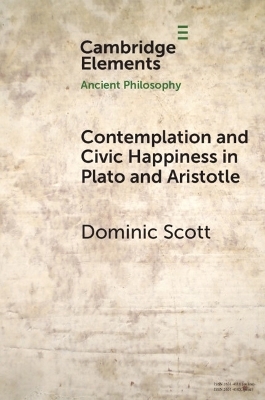
Contemplation and Society in Plato and Aristotle
2024
Cambridge University Press (Verlag)
978-1-009-37259-6 (ISBN)
Cambridge University Press (Verlag)
978-1-009-37259-6 (ISBN)
- Noch nicht erschienen (ca. April 2026)
- Portofrei ab CHF 40
- Auch auf Rechnung
- Artikel merken
This Element explores the value Plato and Aristotle thought of intellectual contemplation in the happiness of the ideal state, examining the Republic, Nicomachean Ethics, and Politics. It questions whether civic happiness is an aggregate of individual happiness or an organic quality arising from state structure.
This Element concerns the civic value of contemplation in Plato and Aristotle: how does intellectual contemplation contribute to the happiness of the ideal state? The texts discussed include the Republic, the Nicomachean Ethics and the Politics, works in which contemplation is viewed from a political angle. The Element concludes that in the Republic contemplation has purely instrumental value, whereas in the Politics and Nicomachean Ethics it has purely intrinsic value. To do justice to the complexity of the issues involved, the author addresses a broader question about the nature of civic happiness: whether it is merely the aggregate of individual happiness or an organic quality that arises from the structure of the state. Answering this question has implications for how contemplation contributes to civic happiness. The Element also discusses how many citizens Plato and Aristotle expected to be engaged in contemplation in the ideal state.
This Element concerns the civic value of contemplation in Plato and Aristotle: how does intellectual contemplation contribute to the happiness of the ideal state? The texts discussed include the Republic, the Nicomachean Ethics and the Politics, works in which contemplation is viewed from a political angle. The Element concludes that in the Republic contemplation has purely instrumental value, whereas in the Politics and Nicomachean Ethics it has purely intrinsic value. To do justice to the complexity of the issues involved, the author addresses a broader question about the nature of civic happiness: whether it is merely the aggregate of individual happiness or an organic quality that arises from the structure of the state. Answering this question has implications for how contemplation contributes to civic happiness. The Element also discusses how many citizens Plato and Aristotle expected to be engaged in contemplation in the ideal state.
1. Introduction; 2. Plato on the social value of contemplation; 3. Aristotle on the social value of contemplation; 4. The extent of contemplation in Aristotle's ideal state; Bibliography.
| Erscheint lt. Verlag | 1.4.2026 |
|---|---|
| Reihe/Serie | Elements in Ancient Philosophy |
| Zusatzinfo | Worked examples or Exercises |
| Verlagsort | Cambridge |
| Sprache | englisch |
| Themenwelt | Geisteswissenschaften ► Philosophie ► Ethik |
| Geisteswissenschaften ► Philosophie ► Philosophie Altertum / Antike | |
| Naturwissenschaften | |
| ISBN-10 | 1-009-37259-9 / 1009372599 |
| ISBN-13 | 978-1-009-37259-6 / 9781009372596 |
| Zustand | Neuware |
| Haben Sie eine Frage zum Produkt? |
Mehr entdecken
aus dem Bereich
aus dem Bereich
unsere kollektive Verantwortung
Buch | Hardcover (2023)
wbg Theiss in Wissenschaftliche Buchgesellschaft (WBG) (Verlag)
CHF 46,90


